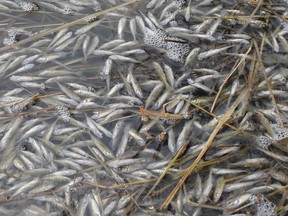'Winterkill' wipes out thousands of fish in Vermilion Lakes near Banff
The well-known phenomenon happens when plants and algae in the water stop producing oxygen due to thick ice, which prevents sunlight from getting through

Article content
Thousands of fish are dead or dying in the Vermilion Lakes near Banff due to a phenomenon known as “winterkill.”
Last weekend, Parks Canada officials were contacted by someone alarmed by the number of dead fish at the surface or under the ice at the lakes — especially the second Vermilion Lake. The dead white suckers and brook stickleback fish can be seen piled up in the few open areas of the frozen lakes and are visible from the shorelines.
The Parks Canada team took oxygen measurements under the ice and determined there were very low levels of oxygen, said Mark Taylor, aquatic ecologist team lead in Banff National Park.
“That in the world of fisheries management is a well-known and understood phenomenon called winterkill,” said Taylor.
When a cold snap causes an extra thick layer of ice and the ice is covered in snow, the sunlight can’t reach the water and the plants and algae in the water stop producing oxygen, explained Taylor. As a result, the oxygen level in the water plummets.

“It’s thousands, if not tens of thousands of dead fish. Most of them are under the ice and you can’t see them,” said Taylor.
This mass death of fish isn’t concerning for the long-term health of fish populations in the park, he said during an interview on Thursday. The fish will decompose and release nutrients back into the ecosystem which will fuel the growth of plants and fish next year.
“There will be a temporary decline in the abundance of fish but the species we found there are quite common in the region. And there will be parts of the lakes where there are survivors,” said Taylor. “It’s a natural process.”
At this time, the Parks Canada team isn’t worried about the draw the decaying fish might have for predators, though visitors should always be cautious. It’s still considered to be low risk but they’ll continue to monitor it, especially if there’s a chinook or warm weather that could bring more predators to the region.
“We just want the public to be aware that we understand what happened,” said Taylor, adding that winterkill has happened at least two other times at these lakes.
“We have records of it happening in 1959 and 1964, and I feel comfortable saying that it’s happened since then, as well. It’s possible it’s happened and gone undetected.”
When fish die, they get waterlogged and sink to the bottom of the lakes, which could mean the fish sank before any visitors to the park noticed or those who saw the fish never reported it to Parks Canada.








Postmedia is committed to maintaining a lively but civil forum for discussion. Please keep comments relevant and respectful. Comments may take up to an hour to appear on the site. You will receive an email if there is a reply to your comment, an update to a thread you follow or if a user you follow comments. Visit our Community Guidelines for more information.